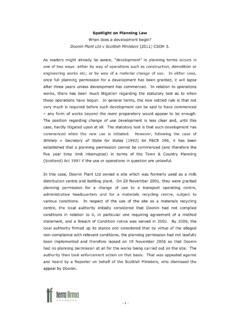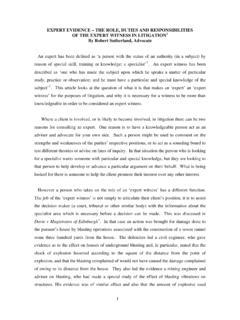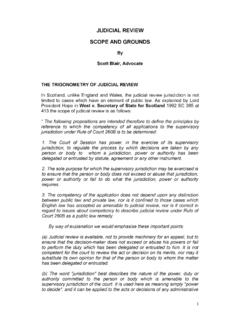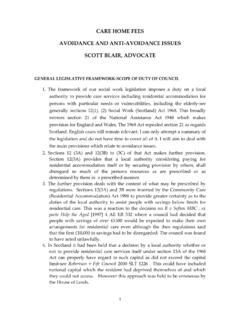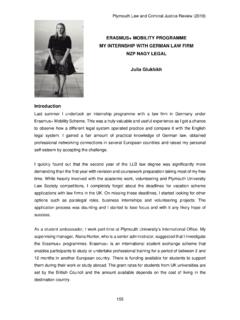Transcription of ‘Real Prospects’ of Success for the New Judicial …
1 168 34 SPEL real prospects of Success for the NewJudicial review process ?strategy to make that happen is adopted; Culture: planning authorities should focus on delivery of development, not just identifying sites; Leadership: councillors need to lead from the front; they may need to make what are sometimes hard/unpopular decisions and to support their planners; Confidence: the planning system is based on exercise of judgment, so planners need to be confident and get on with making decisions, and not be distracted by ifs, buts and maybes; Information overload/gold-plating: a related point: there needs to be confidence to make the decision without requesting more and more information, which causes delay twice over, because the information needs to be prepared and then once it has been submitted, the planning officer needs to review it; Internal management: local authority departments need to work together and liaise with other appropriate bodies such as Scottish Water and Transport Scotland, and planning officers need to be project managers to ensure internal responses are not delayed issues need to be identified early in the process , not drip-fed months afterwards; and Resources: planning authorities need proper financial resourcing to undertake the work necessary to deliver a significant increase in house CollarBrodies LLP1 (This article is based on a discussion paper which can be downloaded from: delivery-of-housing-land)2 Scotland s Third National Planning Framework, at para 3 Circular 6/2013: Development Planning Fig See, for instance, (2014) 166 SPEL 30 April 1985 Rule of Court 260B introduced the newprocedure for Judicial reviews.
2 It provided that an application tothe supervisory jurisdiction of the Court of Session shall bemade by way of any application for Judicial review inaccordance with the provisions of that current Courtof Session Rule ( RCS ) Chapter 58: Applications for JudicialReview, will change in less than six countdown to the changes to applications for judicialreview in Scotland has begun. That which was foretold in theCourts Reform (Scotland) Act 2014 ( 2014 Act ), which receivedRoyal Assent 10 November 2014, is soon to come to pass. On 20 November 2014 the Rules Rewrite Committee of theScottish Civil Justice Council agreed that Chapter 58 RCS shouldbe revoked and rewritten. It is understood that proposals havebeen agreed and drafting is in progress and is next scheduled to be considered at the committee s meeting on 7 April Lord President announced in a speech in January 2015 thatthe introduction of a permission stage in Judicial review will takeeffect from the start of the new legal year in September 2015.
3 Lord Gill has stated that the new Act is the single mostimportant piece of legislation in the field of civil justice for overa century . Judicial review in Scotland in its current form is notthat old but there is no doubt it will be radically changed. The 2014 Act amends s 27 of the Court of Session Act 1988 to introduce significant changes to the procedures for judicialreview in Scotland. The two most significant are, first, tointroduce a time limit of three months. This replaces reliance on the concepts of mora, taciturnity and acquiescence as a tool to limit the time in which administrative actions can be challenged. Second, and the subject of this article, arequirement for permission before a petition for Judicial reviewcan proceed to full hearing is imposed. A court can grant suchpermission only if it is satisfied that the applicant has sufficientinterest in the subject matter of the application and that theapplication has a real prospect of Success .
4 The burden will be on the applicant for Judicial review . There will be a right to request an oral hearing before a different Lord Ordinary if permission is refused on consideration of the papers. Note,unlike in England and Wales, there is no absolute right to anoral hearing. Thus, the approach to the test is of even is a real prospect of Success ? The test of a real prospect of Success is somewhat elusive indeed the Scottish Parliament s Justice Committee has calledfor guidance on the meaning of that phrase, which thegovernment has agreed to consider producing. Some assistancecan be gleaned from the Explanatory Notes to the 2014 Act. At para 125 it states that The reference to a real prospect ofsuccess in s 27B(2)(b) of the 2014 Act, reflects Lord Gill srecommendations. In deciding whether or not to grantpermission, the court will assess not whether the case is merelypotentially arguable but whether it has a realistic prospect ofsuccess subject to the important qualification that arguabilitycannot be judged without reference to the nature and gravity of the issue to be argued.
5 The Policy Memorandum reiteratesthat Gill, in making the suggested changes, referred to ajudgment of Lord Woolf in Swain v Hillman[1999] EWCA Civ3053 where he stated that the words do not need amplification they speak for themselves. The word real distinguishesfanciful prospects of Success and the court needs to take arealistic view. The case must be more than merely arguable(although in my experience arguability is still the test applied in practice in England and Wales).Some further guidance can be gleaned from the recentopinion of Lord Drummond Young in Carroll v Scottish Borders[2014] CSOH determining whether a Protective ExpensesOrder ( PEO ) should be made the court considers theproceedings have no real prospect of Success (see RCS58A(6)(b)). In the PEO context he stated at [14] that it wasimportant that the requirement should not result in a stringentand detailed examination of the applicant s case and as to itsmeaning he stated that there should exist an arguable case,something that has more than a remote prospect of test certainly does not require a probability of Success .
6 If the same approach is followed under the new Judicial review regime, the hurdle will not be a high 35 SPELE xperience from south of the borderThe requirement for permission and the imposition of a hurdlerelated to merit have been a feature of the English and Welshprocedure for some considerable can be learnedfrom experience in the south? As noted above, Lord Gill hassought to use a test which has a considerable track record interms of application. Further, he has extracted the essence ofthe southern case law in his report. It is how that test is appliedin practice that is important. I would identify three featuresfrom experience in England and Wales as they relate toplanning and environmental knock-out blowFirst, there is no general practice which emerges all judicialreviews are usually very fact-sensitive. But judges at thepermission stage are looking for what is often termed a knock-out blow but what this is will vary considerably.
7 A bit likedescribing an elephant, a difficult task but a judge is likely torecognise one when he/she sees it. There a number of wayssuch a blow can be administered. In some instances it can justbe by presenting a clear and logical explanation of the decisionunder challenge, setting it in proper context and relying uponwell-known case law. In other cases it may relate to delay oravailability of an alternative remedy, which needs to be pointedout. In other cases still, it may be possible to point to the lack of practical effect even if the challenge were to succeed. Considered from another angle, the defendant does notrecover costs for putting in an over-extensive rebuttal of theclaim at permission stage. Civil Procedure Rule 54 envisagessummary grounds of defence before permission and detailedgrounds thereafter. The Court of Appeal has made it quite clearthat the level of costs that can be recovered by a defendantwho successfully resists a challenge at permission stage is to be limited, see the discussion in Davey v Aylesbury Vale[2007]EWCA Civ 1166.
8 In particular, see the comment by the Masterof the Rolls at [32] that the courts do not expect substantialexpense to be incurred by defendants at this stage and will not permit recovery of costs which exceeds such expectation. Inpractice, many defendants opt to put in full grounds of defenceat the outset considering that the possible inability to recovertheir full costs thereof is more than offset by the increasedprospect of stopping the challenge at the permission stage. Judges regularly do have regard to the nature and gravity of the issues raised, as the Explanatory Notes to the 2014 Actsuggest should happen in Scotland. For example, if the grant ofpermission would cause prejudice to a defendant by reason ofthe delay engendered by having to await a full hearing a judgemay well look in greater detail at matters before deciding togrant permission to proceed. This is in effect what Mr JusticeSupperstone did in a challenge by Save Britain s HeritageVictorian Society which sought to prevent the demolition of alisted building pursuant to a permission granted by SheffieldCity Council, reported at [2013] EWHC 2456 (Admin).
9 In thatcase he heard submissions from three QCs before determiningnot to allow the challenge to proceed. In my view, judgessometimes apply the test more strictly or set the hurdleslightly more highly in certain cases. Likewise, a challengewhich has considerable history in terms of previous procedureis likely to be scrutinised more closely than one which iscommencing afresh .Practice varies with the individual judgesSecond, practice varies with the individual judges changes are being wrought to Judicial reviewprocedure down south under the guise of Part 4 of the Criminal Justice and Courts Act 2015 with the apparent aim of increasing the hurdles to bringing such a claim although no change is proposed to the basic test at permission stage. During the debate on the new procedures investigation haspurportedly shown that the Success rates of applications canvary significantly with different judges.
10 There is, however,nothing particularly startling in that observation. An applicationin a planning matter before a very experienced planning judge,such as, say, Ouseley J or Lindblom J, is likely to receive verydifferent treatment from another judge who does not have theirexpertise. They may get the point of the challenge more quickly,but they may also see its weaknesses too. What will beimportant in Scotland is whether as a whole the judges seetheir role as merely weeding out the obviously more unmerit-orious case, which is the general approach down south in myexperience, or set a higher standard which may have, arguably,unwelcome results in terms of access to justice. The rolled-up procedureFinally, and particularly in complicated planning/environmentalchallenges, the courts down south have devised what is called a rolled up procedure, particularly if permission has first beenrefused on the papers.
